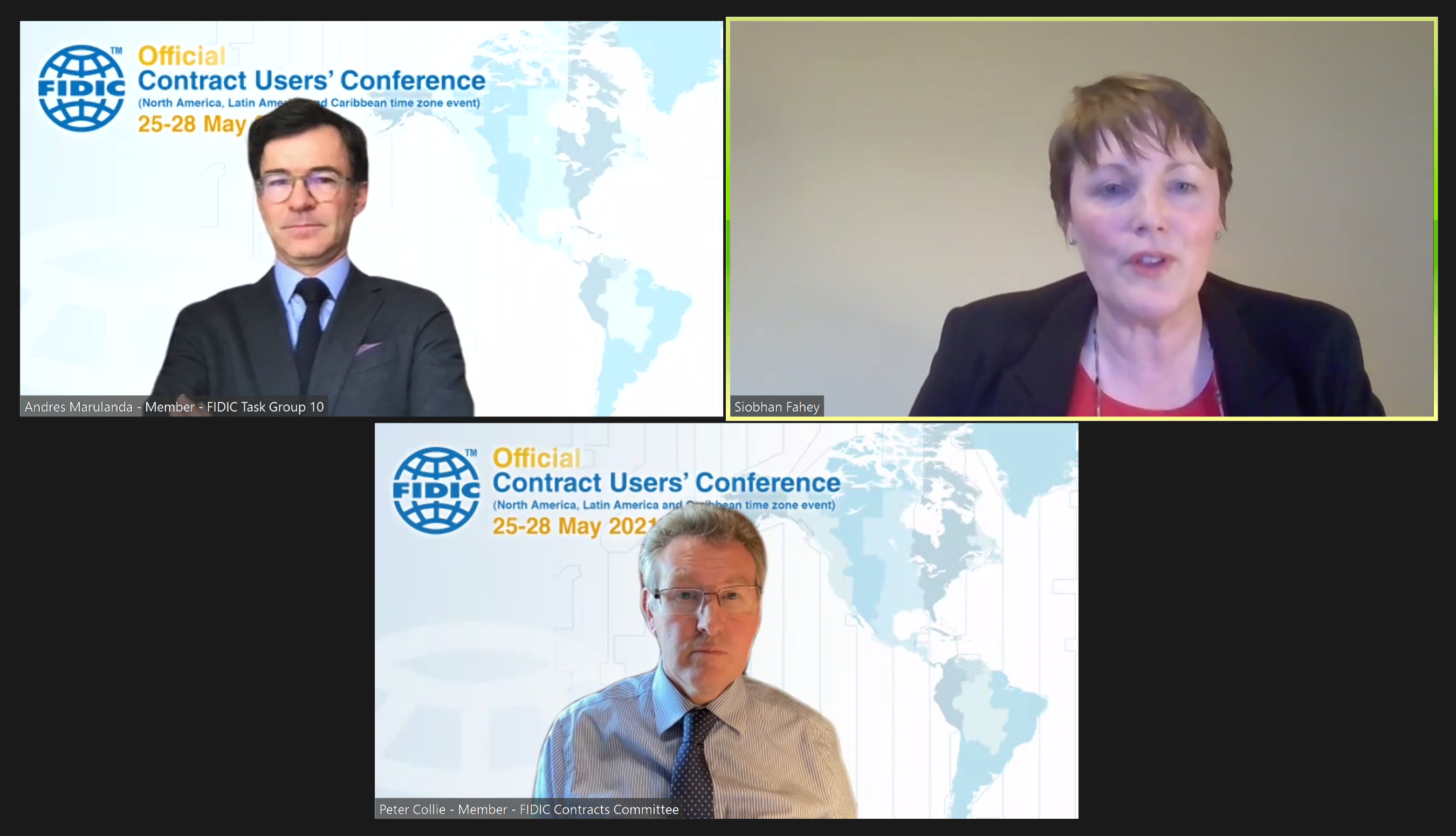The Official FIDIC Contract Users’ Conference (North America, Latin America and Caribbean time zone event) was staged online and delivered in-house by FIDIC from 25-28 May 2021, writes FIDIC communications advisor Andy Walker.
The event, sponsored by global strategic partner, international law firm CMS, targeted the Latin America, Caribbean and North America contract users’ community and gave delegates and ‘watch again’ viewers a unique opportunity to share progress on the application and use of FIDIC contracts internationally and across the region. The event included participation from MDBs, private sector organisations and clients, government, engineers, contractors, investors, consultants, and other stakeholders who have an interest in FIDIC contracts.
Introducing the event, FIDIC president Bill Howard highlighted the importance of using FIDIC contracts in an unamended format and adhering to its ‘Golden Principles’ to guard against problems arising on projects. He also praised FIDIC for being able to hold events like this one during what has been a challenging year with the pandemic creating issues for the industry to address like never before.
Opening the first session of the conference, FIDIC president elect Anthony Barry spoke about the important role of the FIDIC contracts committee in developing this key area of the organisation’s business and supporting the construction and infrastructure sector. “Our contracts do not stand alone in the industry – they are backed up by many other documents and approaches, including the FIDIC Body of Knowledge, and are part of a whole eco-system that is integrated in such a way that supports all those that use them across our industry,” said Barry.
The breadth of FIDIC contracts’ use across the global industry was indicated by the number of translations in circulation, said Barry, who also highlighted the significance of the contracts being adopted and used by many of the international multilateral development banks. “FIDIC contracts can be used by developed and developing nations because of the eco-system we have in place to support their use,” he said. Barry also urged delegates to engage proactively with FIDIC to help influence the development of contracts and offer feedback on the work of the contracts committee to ensure that the organisation remained at the cutting edge of the global construction contract arena.
The next speaker, FIDIC contracts committee chair Vincent Leloup, spoke about the evolution of FIDIC contracts, highlighting new contracts in the pipeline, new initiatives and developments including the new FIDIC Green Book. He outlined some of the 14 clauses and key changes in the new FIDIC Short Form of Contract (Green Book) 2nd Edition, which is due to be published towards the end of 2021. Some of the changes in this new 2nd edition include the addition of ‘boilerplate’ clauses on intellectual property, confidentiality, limitation of liability, testing provisions, date of completion, performance certificates, claim and variations, employer’s risks and liquidated damages provision.
A key benefit of the Official FIDIC’s Contract Users’ Conferences is the opportunity to get the inside track on new documents in development and Leloup was able to update delegates on ongoing work on the FIDIC Bronze Book: Form of ODBO Contract for brownfield projects and other new initiatives for 2021, including new contracts on Collaborative Contracting, PPP Projects and EPCM, all of which are scheduled for release at the end of 2021.
The second session of the conference, chaired by FIDIC contracts committee member Siobhan Fahey, offered an overview of the FIDIC Suite of Contracts, including the FIDIC Red, Silver, Yellow Book 1999 vs the 2017 edition and the main features and differences between the Green and Gold Books. She reiterated the advice to use official translations of the FIDIC contracts as an extra safeguard and also underlined the enduring popularity of the contracts as offering a balanced and fair allocation of risks between the employer and the contractor.
Fahey covered a number of key areas to bear in mind when using FIDIC contracts including communications issues, time limits, agreement and determination by the engineer, programming, employer requirements, contractors and design, claims, disputes and arbitration. Once again, delegates were treated to inside track knowledge from someone who knows FIDIC contracts inside out.
Speaking second in session two was another FIDIC contracts committee member, Peter Collie, who examined the key topics of the FIDIC Suite of Contracts, namely, time, payments, design, variations, risk and insurance and taking-over work. Collie gave a useful and practical overview of the key responsibilities, obligations and stipulations outlined in the contracts by clearly outlining them in basic and easy-to-understand terms, which was well received by delegates.
Next, delegates heard an update on the Emerald Book, the FIDIC Contract Form for Underground Works, from Andres Marulanda, a member of the FIDIC Task Group 10 that developed the contract. Marulanda gave the background to the need for the Emerald Book, which he said was because underground construction projects demand special contractual considerations due to the difficulty of predicting ground behaviour and unforeseen conditions that give rise to an inherent uncertainty for tunnelling projects. As a result, the allocation of underground risks among stakeholders is critical in underground construction, said Marulanda.
He highlighted the Emerald Book’s distinctive approach to risk allocation which had been designed specifically with underground projects in mind and developed in close collaboration with the International Tunnelling Association. In particular, risk allocation is based on a Geotechnical Baseline Report (“GBR”) and a Schedule of Baselines and Geotechnical Data Report (“GDR”). The intention of the contract is that the employer should carry out significant investigations prior to tendering the works to obtain as much information as possible regarding subsurface risk (including water risks). Foreseeable risks (i.e. those risks identified in the GBR) are allocated to the party best placed to manage them. This balanced approach to risk was central to the approach of the contract, Marulanda said.
The final session of the first day of the conference looked at the impact of Covid 19 on infrastructure projects and the lessons to be learned. Chaired by FIDIC contracts committee member Husni Madi, the session was opened by Christopher Seppala, special advisor to the FIDIC contracts committee, who highlighted the implications of Covid-19 impacts in different jurisdictions. Seppala examined the issues from a civil law versus common law perspective and looked at the key lessons to be learned and how FIDIC contracts had addressed the Covid pandemic.
Seppala looked at the different ways in which a range of jurisdictions had dealt with the impact of the pandemic and the recourse available to those working on construction contracts. He concluded that parties could expect only very limited relief for Covid from the governing law and said that neither the civil law nor the common law are very helpful. Seppala said that parties needed to address events like Covid-19 and its consequences in the contract and that while health disasters could be addressed more specifically, FIDIC contracts largely do this successfully, as the conditions provide for more than 80 contingencies for claims by either the employer or the contractor and should be commended for that.
Husni Madi then looked at how governments have reacted to the pandemic and how best to deal with the impacts of Covid-19 under the FIDIC forms, including possible recourse to force majeure, exceptional events and FIDIC’s Covid Guidance memorandum for works contracts and the impacts on services agreements. In a wide-ranging presentation, delivered in his usual entertaining and engaging style, Madi said that the differing experience and stage of the pandemic in different countries had led to a variance in the way that territories had dealt with the effects of Covid. As an international organisation, FIDIC had to take a global approach to the guidance it issued to account for different jurisdictions. “The guidance that FIDIC has issued on Covid has been purely from a contractual standpoint,” said Madi. He advised delegates to “sit down together, collaborate and have open meetings to think about creative solutions” to the challenges faced as a result of Covid. “Have sympathy and empathy with the people you are working with,” said Madi.








